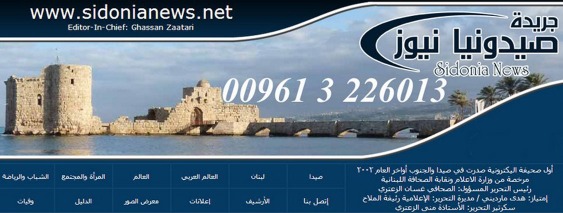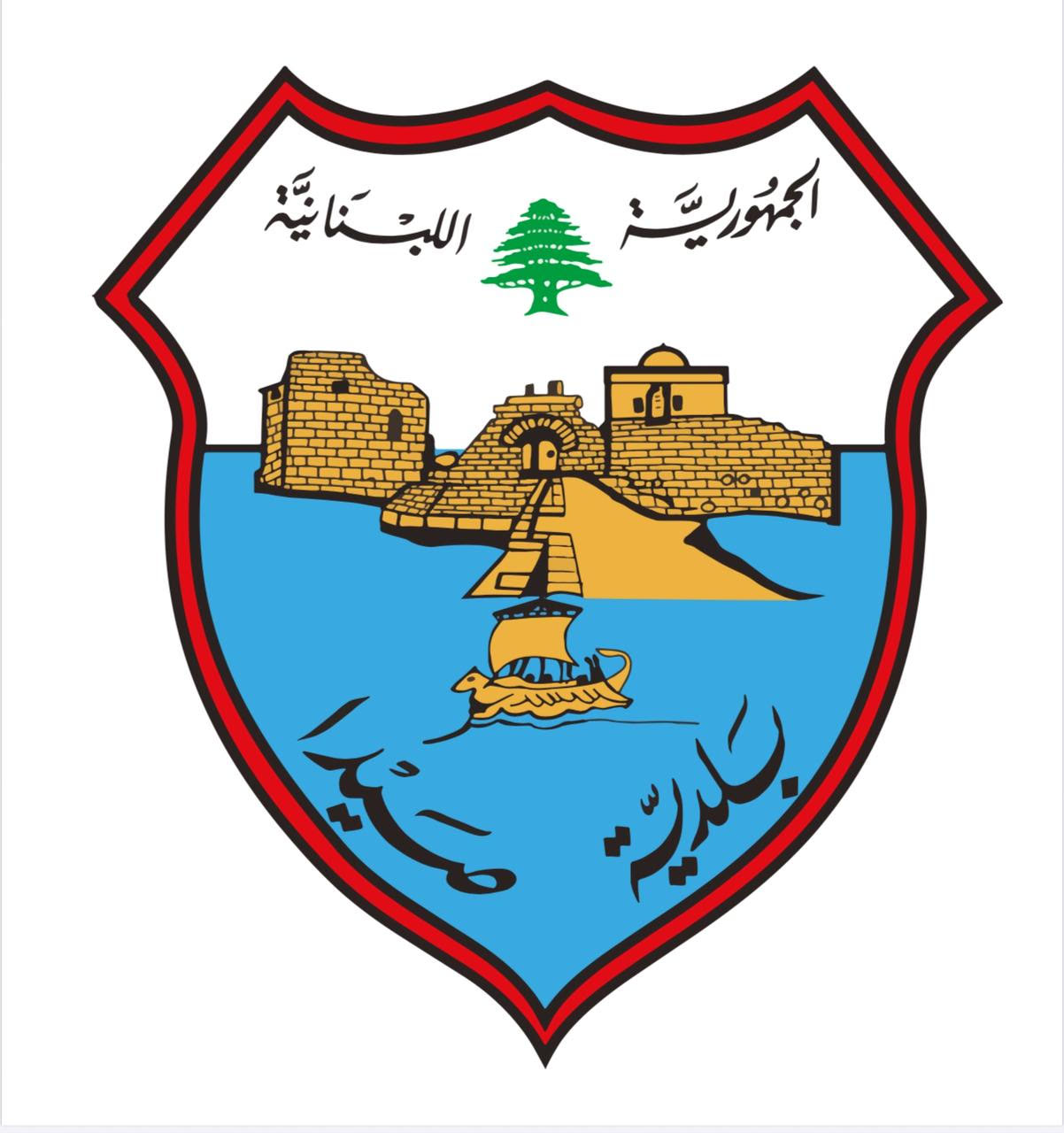Sidonianews.net
-----------
15-9-2025
بلدية صيدا - المكتب الإعلامي
إعلان دعوة لتقديم مقترحات صادر عن بلدية صيدا وبالتعاون مع برنامج الأمم المتحدة الإنمائي UNDP
تعلن بلدية صيدا، وبالتعاون مع برنامج الأمم المتحدة الإنمائي (UNDP)، عن فتح باب التقديم أمام المنظمات غير الحكومية المحلية للمشاركة في دعوة لتقديم مقترحات لتشغيل وحدة المرصد الحضري في مدينة صيدا.
- الموعد النهائي للتقديم: يوم الخميس الواقع في 18 أيلول 2025، الساعة الثانية عشرة ظهراً.
- مكان ووقت تسلّم الطلبات: بلدية صيدا، من الساعة الثامنة صباحاً ولغاية الثانية بعد الظهر.
مرفق ربطاً الشروط المرجعية (TOR) الخاصة بالتقديم.
------------------
أدناه الشروط المرجعية TOR
Terms of Reference (TOR) Selection of a Local NGO to Operate the Urban Observatory Unit
Technical Expert - Capacity Building for Urban Observatory Unit in Saida
Project Title: Local Development and Local Governance Portfolio / Lebanese Host Communities Support Project 2.0 - 00084708
Prepared by: Mahdi Maatouk
Date of Submission: Friday 29th of Aug 2025
Contract Duration: 24 working days over 6 weeks
Contract End Date: No later than 22 September 2025
Contents
Terms of Reference (TOR) Selection of a Local NGO to Operate the Urban Observatory Unit 1
Technical Expert - Capacity Building for Urban Observatory Unit in Saida 1
I. Project Background 1
II. Objective 1
III. Scope of Work 1
IV. Eligibility and selection Criteria 3
V. Evaluation and Selection 4
VII. Application Requirements 4
Ethical Considerations 5
I. Project Background
The United Nations Development Programme (UNDP) has been actively supporting local governance and development in Lebanon, in the scope of improving municipal capacities in planning mechanisms, capacity building, data collection, and transparency. Saida, Lebanon’s third-largest city with a population of approximately 110,000 residents, has been identified as a key location for the establishment of an Urban Observatory unit program to address gaps in evidence-based planning and inter-institutional collaboration.
The need for such a unit was emphasized during the participatory Mechanism for Stability and Local Development (MSLD) process held back on March 2023. Through this process, it became evident that, despite the availability of various development strategies and reports, Saida lacks both a comprehensive, dynamic diagnostic of its local situation and an institutionalized platform for coordination among active entities in the city leading to blind planning.
The Urban Observatory Unit aims to provide a data-driven environment that supports effective decision-making and service delivery. The unit will focus on nine core sectors including infrastructure, urban development, environment, demography, economy, health, education, as well as social and public services. Its establishment aligns with international standards as guided by UN-HABITAT and is intended to foster transparency, improve data sharing, and enable inclusive planning.
II. Objective
The primary objective is to identify and engage a capable, experienced, and locally grounded NGO that can effectively operate the Saida Urban Observatory Unit under the direct supervision of the municipality. The selected NGO will support the development and operation of the Observatory, ensuring it serves as a hub for data-driven urban policy and inclusive planning. This collaboration seeks to strengthen municipal capacity, integrate local voices into the planning process, and ensure that the Observatory remains sustainable while staying responsive to community needs and priorities for the long term.
III. Scope of Work
The selected NGO will play an operational role in the Urban Observatory and undertake multiple technical and community centered tasks. These include:
• Data Collection and Analysis
• Design and implement data collection tools including surveys, participatory mapping, and GIS systems
• Conduct comprehensive data collection and analysis across all nine sectors
• Establish clear criteria for primary and detailed data categorization
• Link findings with Disaster Risk Reduction (DRR) scope of work
• Community Engagement and Stakeholder Coordination
• Facilitate dialogue with community stakeholders, ensuring broad participation in shaping urban priorities
• Build and maintain sectoral networks with government agencies, NGOs, CSOs, and educational institutions
• Coordinate with the Municipality of Saida and project Steering Committee
• Capacity Building and Knowledge Transfer
• Build capacity of municipal staff and steering committee members in data literacy and participatory planning methodologies
• Translate findings into accessible formats that inform local policies and programs
• Provide training on data management and urban planning tools
• Data Accessibility and Management
• Ensure data accessibility to local stakeholders (NGOs, CSOs, educational institutions)
• Implement tiered data access system (free primary data, paid detailed data)
• Maintain data protection protocols and open data standards
• Ensure interoperability with municipal systems
• Reporting and Analysis
• Prepare quarterly local analysis reports on sectors' needs, potentials, and opportunities
• Provide recommendations on interventions that will alleviate tensions, reduce inequality, and enhance local development
• Submit periodic progress reports with recommendations and guidance
• Sustainability Planning
• Develop and implement sustainability strategies for long-term Observatory operations
• Establish revenue generation mechanisms where appropriate
• Create succession planning for knowledge transfer
IV. Eligibility and selection Criteria
A. Registration: Legally registered NGO under Lebanese law, with a proven record of compliance with all legal and regulatory requirements.
B. Experience: Minimum 5 years of continuous and documented experience in urban development, environmental monitoring, or data-driven governance and a proven past experience with donor-funded projects at a similar or larger scale.
C. Capacity: Willingness and capacity to prepare annual in-kind or financial contributions to the Urban Observatory’s operations, capacity building, and technology upgrades.
D. Financial: Transparent and robust financial management systems, with externally audited project statements for the past 3 years, and a history of managing multi-year, multi-stakeholder projects.
E. Operations: Operational presence in Saida district, with a permanent office and sustained local engagement.
F. Ability: Ability to access, lead, and sustain local sectoral networks in governance, monitoring, research, and engagement, demonstrated by:
• Strong connections with national government agencies, municipal unions, and technical bodies.
• Strong collaboration and previous experience with academic institutions.
• Membership and active participation in international networks for sustainable urban development and city data through manifesting their work (list their international network, official memberships status documents etc..)
G. Collaboration: Minimum of 3 years of experience/ coloberation with with Saida Municipality, and one related project.
H. MoU: willingness to sign an MOU with Saida municipality with detailed roles, responsibilities, data ownership, operational protocols, and sustainability plans.
I. Technical Capacity: Proven technical capacity in:
• Designing and managing urban data systems, GIS platforms, and observatories at municipal or regional scale.
• Conducting advanced research, large-scale data collection, multi-dimensional analysis, and visualization of social, economic, environmental, and spatial indicators.
• Applying recognized open data standards, ensuring interoperability with municipal systems, and implementing strict data protection protocols.
J. Commitments: Commitment to gender equality, social inclusion, accessibility, and adherence to international standards for inclusive urban development. Including adherence to data sensitivity and ownership.
K. Staff: Highly qualified staff, including senior experts in urban planning, environmental management, GIS/data science, statistics, ICT, stakeholder engagement, and communications with documented track records of at least 5 years in their respective fields.
L. Technical Proposal: Applicants to submit a detailed Technical Proposal outlining their proposed approach to establishing the structure and operational framework of the Urban Observatory, including but not limited to:
• Previous Experience and Team Composition.
• Proposed Institutional and Governance Structure.
• Proposed Operational Plan & Methodological Framework.
• Thematic Focus Areas & Stakeholder Engagement Strategy.
• Sustainability and Capacity Development & Proposed Business Model.
V. Evaluation and Selection
A Selection Committee composed of representatives from the Municipality (Mayor in-focus) and the project Steering Committee will evaluate applications. A weighted scoring system will be used to ensure transparency and fairness, as detailed below:
Criterion Weight (%)
Relevant institutional experience 25%
Technical proposal & understanding of assignment 25%
Human resources and team composition 20%
Local presence and stakeholder relationships 15%
Past performance / Projects history 10%
Gender inclusion & social equity considerations 5%
Shortlisted NGOs may be invited to present their proposal and respond to questions. Final selection will be based on a combination of technical merit, contextual understanding, and alignment with project values and the set of criteria listed above.
The performance of the recruited NGO shall be conducted annually through a predefined mechanism co-developed with the Municipality. To ensure rotation and optimal performance the recruitment shall be conducted every 4 years.
VII. Application Requirements
Required Documents
1. Technical Proposal (maximum 25 pages as outlined in Section IV.L)
2. Legal Documentation
o NGO registration certificate
o Tax clearance certificate
o Legal compliance certificates
3. Financial Documentation
o Audited financial statements (past 3 years)
o Bank references
o Evidence of financial capacity
4. Experience Documentation
o Project portfolio with references
o Client testimonials
o Relevant certifications or awards
5. Human Resources
o Detailed CVs of proposed team members
o Organizational chart
o Letters of commitment from key staff
Submission Requirements
• Format: electronic copy (PDF)
• Language: English or Arabic with English summary
• Deadline: Specify
• Contact Person: Specify
• Email: Specifuy
• Phone: Specify
Ethical Considerations
The selection process will adhere to principles of transparency, accountability, and fairness. All applicants must disclose any potential conflicts of interest. The selected NGO will be expected to operate in compliance with anti corruption standards and uphold ethical conduct in all project related activities. Commitment to safeguarding, data protection, and inclusive practices will be essential throughout the partnership.
Note: This TOR may be subject to minor revisions based on stakeholder feedback. Any changeswill be communicated to all interested parties through official channels.
2025-09-15
دلالات:
المصدر :جريدة صيدونيانيوز.نت






